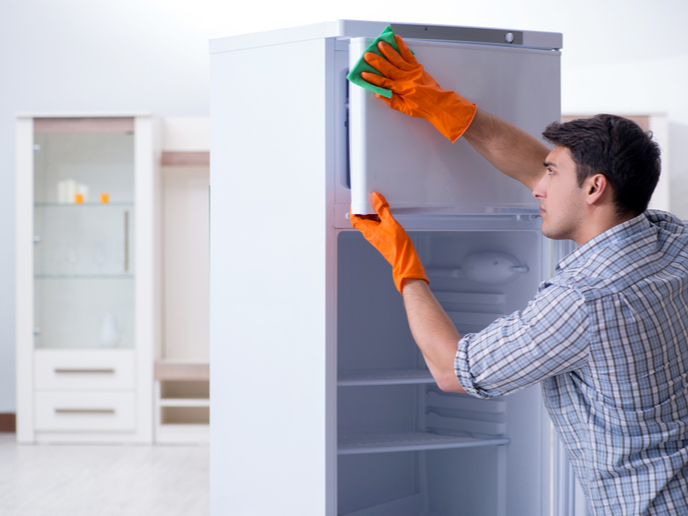No fingerprints or dirt on my fridge, thank you!
Is keeping your oven or fridge clean without detergents or heat possible? Yes, according to scientists supported by the EU-funded LAMPAS project. A new laser system developed by the project team has the potential to treat metal so that no water, dirt or grease can attach to it. By introducing grease-repellent and antibacterial properties into sheet metal, the high-power laser technology could lead to dishwashers and fridges fitted with fluid-repellent surfaces in the future. According to a press release(opens in new window) posted on the LAMPAS project website, the laser creates an amphiphobic surface on the metal that repels both water and oil. The tiny 'spikes' or 'ridges' on the laser-textured metal surface prevent dirt and liquids from sticking to it while similar micro/nanostructures reduce bacteria build-up. Treating sheet metal so that it repels water and bacteria isn’t a new concept, but preventing fingerprints from being left on a metal surface is. “We are treating sheet metal to obtain what we at LAMpAS call ‘anti-fingerprint’ characteristics,” observes Dr Francesca Moglia of project partner European Photonics Industry Consortium in the same press release. “If we use this metal on the outside of a refrigerator, an oven or kitchen surface, the user would not have to clean finger or hand marks so often – meaning your fridge always stays shiny. The treatment of surfaces with special laser radiation and beam transport systems to improve their antibacterial properties opens up new frontiers in applications. LAMpAS is using high-power ultrashort-pulsed lasers to create a rough micro-topography on sheet metal that will cause liquids to ‘glide’ across the surface, thus, reducing the formation of a biofilm.”
Technology applications
The researchers are tailoring sheet metal for use in various applications. “We are targeting related use cases: medical surfaces in hospitals, like stainless steel antibacterial surfaces; packaging machines in the pharma industry that need to be disinfected; machines in the food processing sector that need [to] be continually cleaned and where hygiene is paramount,” explains Prof. Dr Andrés Fabián Lasagni of project coordinator Dresden University of Technology. Although currently being applied only to metal, the laser technique could also be used on materials such as glass and plastic. “Anything that requires complete hygiene will benefit greatly from antibacterial surfaces such as hospital and operation environments that must be continually cleaned during surgical procedures.”
Aiming for industrial manufacture
The metal surfaces are being treated using photonics devices, with the ultimate aim of manufacturing self-cleaning metal sheets industrially. “The idea of using photonics or high-powered lasers to create tiny structures on metal is nothing new but has always been too expensive to produce and too time-consuming,” states Prof. Dr Lasagni. “Our laser system will allow us to treat more than 1 square metre of sheet metal per minute covering a potentially growing market that could reach nine-digit revenues per year in the home-appliance sector alone. With our innovative Direct Laser Interference Patterning (DLIP) – Polygon Scanner head we will be able to treat metal with a 1.5 kW novel ps-laser source, with scanning speeds over 100 m/s,” he goes on to explain. The LAMPAS (High throughput Laser structuring with Multiscale Periodic feature sizes for Advanced Surface Functionalities) technology will help meet the rising demand for affordable products with novel surface performances. The 3.5-year project ends in June 2022. For more information, please see: LAMPAS project website(opens in new window)



